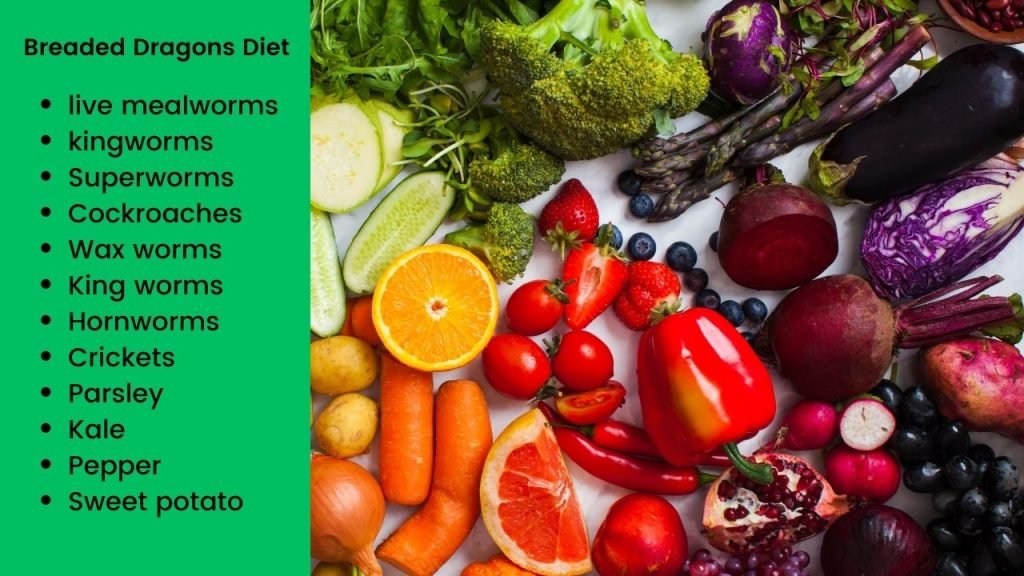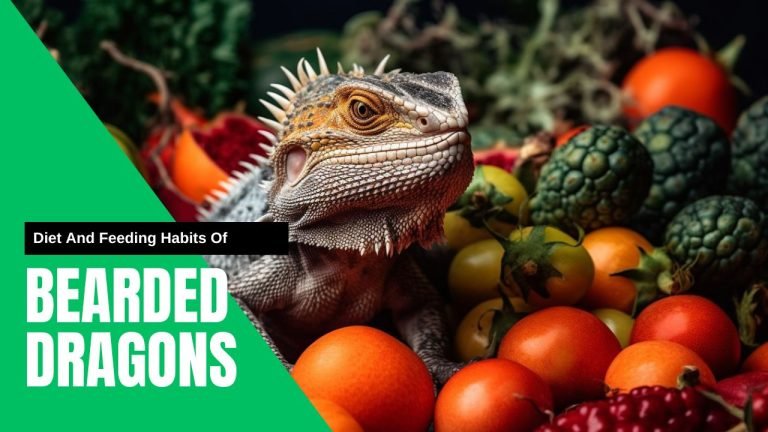As a bearded dragon owner, you want to provide the best possible care for your scaly friend.
One of the most important aspects of their care is their diet and feeding habits.
Understanding what they eat in the wild and how to replicate that in captivity can ensure a healthy and happy life for your pet.
Bearded dragons are omnivores, meaning they eat both plant-based foods and insects or small animals.
In the wild, they primarily consume insects such as crickets and mealworms, as well as some vegetation like flowers and fruits.
However, in captivity, it’s important to offer a variety of food items to meet their nutritional needs.
With proper knowledge and planning, you can create a balanced diet that will keep your bearded dragon thriving for years to come.
Table of Contents
Understanding the Natural Diet of Bearded Dragons
You’re in for a real treat as we explore the natural tastes and preferences of bearded dragons. These creatures are omnivorous, meaning they eat both plants and animals.
In the wild, their diet consists mainly of insects, small mammals, birds, and vegetation. Bearded dragon feeding behavior is fascinating to observe. They are opportunistic feeders, which means they’ll eat whatever food source is readily available to them at any given time.
This type of feeding behavior allows them to adapt quickly to changes in their environment. Insects such as crickets, locusts, and mealworms are a favorite food source for bearded dragons. Vegetation such as flowers, leaves, and fruits also make up a significant part of their diet.
By understanding what these creatures would eat in the wild, we can better understand how to provide them with adequate nutrition in captivity.
Nutritional Requirements for Captive Bearded Dragons
The nutritional needs of captive bearded dragons can be met with a balanced diet that includes calcium-rich foods, such as collard greens or kale, which should make up 25-30% of their diet.
In addition to vegetables, feeding insects to bearded dragons is important for protein intake. Popular choices include crickets and mealworms, but they should be dusted with Bearded dragon dietary supplements before being fed to ensure adequate nutrient absorption.
It’s important to note that the ratio of vegetables and insects may vary depending on the age and size of your bearded dragon. Younger dragons require more protein than adults, so their diets should consist of 80% insects and 20% vegetables until they reach maturity.
Adult dragons only need about 50% of insects in their diets. Feeding them too much protein can lead to obesity and other health problems.
In order to maintain a healthy weight and digestive system, it’s recommended to feed adult bearded dragons every other day while juveniles should eat daily.
It’s also important to provide fresh water at all times. By following these guidelines for nutritional requirements and feeding habits, you can help ensure a happy and healthy life for your beloved pet bearded dragon.
Feeding Schedule for Bearded Dragons
If you want to ensure your pet stays healthy, it’s important to establish a consistent feeding schedule for them.
Bearded dragons are omnivorous and require a balanced diet consisting of both plant and animal matter. You should feed your bearded dragon daily, offering fresh food in the morning and removing any uneaten portions in the evening.
Feeding frequency is dependent on the age of your bearded dragon. Younger dragons require more frequent feedings, while adults can go longer between meals. Feed babies three times a day, juveniles twice a day, and adults once a day. Ensure that portion sizes are appropriate for their size – overfeeding can lead to obesity and health problems.
Setting up a regular feeding schedule not only ensures that your bearded dragon gets all the necessary nutrients they need but also helps with digestion and avoids potential health issues caused by irregular feeding habits.
Remember to provide fresh water at all times as well. In the next section, we’ll discuss the types of food you should offer your bearded dragon to ensure they have a well-rounded diet.
Types of Food for Bearded Dragons
Bearded dragons require a variety of fresh foods to maintain their health and well-being. When it comes to feeding your bearded dragon, you have two options: insects or vegetables.
While both are important parts of their diet, vegetables should make up the majority of their food intake. Insects like crickets and mealworms provide the necessary protein, but too much can lead to obesity and other health problems.
When choosing vegetables for your bearded dragon, it’s recommended to stick with leafy greens such as collard greens, kale, and mustard greens. These are high in calcium and other essential vitamins that your pet needs to thrive. Fruits like strawberries and blueberries can also be added in small amounts as treats.

It’s important to note that while commercial diets may seem convenient, they often lack the necessary nutrients that fresh fruits and vegetables provide. Homemade diets are a great option for those who prefer more control over what their pet is consuming. By creating a balanced mixture of fruits and veggies as well as protein sources like insects or cooked chicken, you can ensure that your bearded dragon is getting everything they need to stay healthy.
Remember to always wash produce thoroughly before feeding it to your pet.
Now that you know about the types of food for bearded dragons, let’s move on to feeding tips for owners.
Feeding Tips for Bearded Dragon Owners
To ensure your pet is healthy and happy, it’s important to develop good feeding practices that incorporate a variety of fresh foods. Bearded dragons require a balanced diet that consists of both animal-based and plant-based foods.
You can provide your bearded dragon with a range of fruits and vegetables such as collard greens, kale, carrots, apples, and strawberries.
When preparing food for your bearded dragon, it’s essential to wash all produce thoroughly before feeding them. Cut the fruits and vegetables into pieces that are small enough for your pet to eat comfortably.
Younger bearded dragons may need smaller portions than their adult counterparts. It’s also crucial to include supplements in their diet such as calcium powder or multivitamins. These supplements help prevent nutritional deficiencies that can lead to various health problems.
Lastly, avoid overfeeding your bearded dragon by providing only the recommended amount of food daily. Overfeeding can lead to obesity which is a common problem among captive reptiles.
Additionally, make sure you remove any uneaten food after 15-20 minutes to avoid spoilage or contamination from bacteria or fungi growths.
By following these tips, you’ll help ensure your pet has a long and healthy life while enjoying its favorite foods!
Frequently Asked Questions
Can bearded dragons eat fruits and vegetables exclusively?
If you’re considering feeding your bearded dragon a diet of fruits and vegetables exclusively, it’s important to understand the nutritional value and potential risks involved.
While these foods can provide some nutrients, they lack the balanced diet that bearded dragons need to thrive. Without a variety of protein sources and other essential vitamins and minerals, your pet may suffer from malnutrition or health problems.
Supplementing with calcium and other necessary supplements can help, but it’s still best to incorporate live insects into their diet as well.
Overall, a varied diet is key for keeping your bearded dragon healthy and happy.
How often should bearded dragons be fed live insects?
Hey there, it’s important to maintain a healthy and balanced diet for your bearded dragon to ensure they live a long and happy life.
When it comes to their feeding frequency, it’s recommended to feed them live insects every day when they are young, and gradually decrease the frequency as they age. A good rule of thumb is to feed them insects 2-3 times a week once they reach adulthood.
It’s crucial to remember that nutritional balance is key in their diet, so while it may be tempting to stick with one type of insect or food item, make sure you’re providing variety in their meals. That way, you can ensure your beloved pet has all the necessary nutrients required for optimal health!
What is the best way to gut-load insects for bearded dragons?
To ensure that your bearded dragon is getting the proper nutrition, it’s important to gut-load their live insects with protein sources and high nutritional value.
You can do this by feeding the insects a variety of fruits and vegetables such as carrots, sweet potatoes, and collard greens.
It’s also important to provide a calcium supplement for your feeder insects so that your bearded dragon receives a good source of calcium when they eat them.
By providing nutrient-rich insects, you’re giving your bearded dragon the best possible chance at staying healthy and thriving.
Are there any foods that bearded dragons should never eat?
Potential dangers exist for bearded dragons when consuming certain foods. Common misconceptions about their diet include feeding them iceberg lettuce or spinach, which can lead to nutrient deficiencies and health problems.
Additionally, some fruits and vegetables may contain high levels of oxalates that can cause kidney stones in the long run. Expert opinions suggest avoiding these potential dangers by incorporating alternative options such as collard greens, dandelion greens, and butternut squash into their diet instead.
It’s always important to research and consults with a veterinarian before introducing new foods to your bearded dragon’s diet to ensure they receive proper nutrition without any harmful effects.
How can I tell if my bearded dragon is overweight or underweight?
Imagine your bearded dragon as a car on the road. If it’s carrying too much weight, it can’t move as quickly and may even break down.
On the other hand, if it’s too light, it may not have enough fuel to keep going. The same goes for your pet’s nutrition and weight management.
Bearded dragon nutrition is crucial for maintaining a healthy body weight. To determine if your pet is overweight or underweight, look at their belly scales – they should be flat but not sunken in or bulging out.
A healthy bearded dragon should also have visible muscle tone without any extra fat around their limbs or neck. Remember to monitor their diet and feeding habits regularly to ensure they stay happy and healthy!
Conclusion
Now that you’ve got a better understanding of the diet and feeding habits of bearded dragons, it’s important to remember that providing them with a balanced and nutritious diet is essential for their health and well-being. They are omnivores, so they require both plant-based and animal-based foods in their diet.
One interesting statistic to keep in mind is that bearded dragons can live up to 20 years in captivity if properly cared for. This means that feeding them the right types of food at the right time will contribute greatly to their longevity.
So, make sure to provide your bearded dragon with a variety of fresh fruits, vegetables, insects, and protein sources like chicken or fish.
Overall, keeping your bearded dragon healthy and happy requires a little bit of knowledge about their dietary needs. By following the tips outlined in this article and consulting with your veterinarian as needed, you’ll be able to maintain a healthy diet for your beloved pet.


